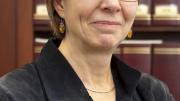Physicist Cherry A. Murray, dean of the School of Engineering and Applied Sciences and Armstrong professor of engineering and applied sciences, was named one of this year’s recipients of the National Medal of Technology and Innovation. President Barack Obama made the announcement on October 3.
Murray, who holds a bachelor’s and a doctoral degree from MIT, was appointed dean in 2009. Among other accomplishments under her leadership, SEAS has established the Institute for Applied Computational Science (IACS), to foster inquiry into the application of computational methods to science and engineering challenges, and has created a new master of science degree program. (It welcomed its first class last fall.) Murray wrote about engineering in this century for Harvard Magazine's issue on the University's 375th anniversary.
Named one of Discover magazine’s “50 Most Important Women in Science” in 2002, Murray has had a long career in both management and research. She came to Harvard from the Lawrence Livermore National Laboratory, after earlier work at Bell Laboratories. She has served on more than 80 national and international scientific advisory committees, governing boards, and National Research Council panels, including the National Commission of the BP Deepwater Horizon Oil Spill and Offshore Drilling in 2010. She has studied diverse topics in condensed matter physics, and is particularly known for using light scattering, a technique that bombards an object of study with photons. Murray is a member of the National Academy of Sciences, the American Academy of Arts and Sciences, and the National Academy of Engineering.
In an interview with the American Physical Society—she served as its president in 2009—Murray said that she had been raised by a family of artists and expected to become one herself. Then two things happened: her high-school chemistry teacher awoke her interest in science, and her older brother told her she would never succeed in physics—and certainly not at MIT—which spurred her to do just that.
She and her fellow medal recipients will be honored at a White House ceremony later this year.
Read the University news release about her National Medal here.









